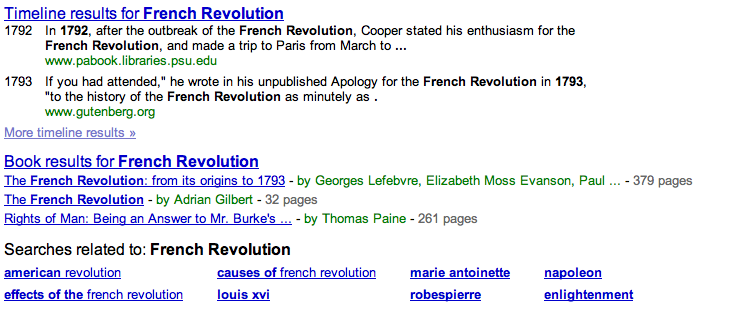Google Implements ‘Orion’ Technology, Improves Search Refinements & Adds Longer Snippets
Google is announcing two changes to search results this morning. The first involves the use of longer “snippets” (text extracts containing the keywords) when users input queries of three words or more. The objective is to provide more context to help the user determine if the site is worth visiting. Many search engines have attempted […]
Google is announcing two changes to search results this morning. The first involves the use of longer “snippets” (text extracts containing the keywords) when users input queries of three words or more. The objective is to provide more context to help the user determine if the site is worth visiting. Many search engines have attempted to address this same problem with visual tools or “previews” of one sort or another. (Vanessa will postscript with more detail about snippets.)
It’s difficult to predict whether or how longer snippets will affect user behavior but it may create incentives to input longer queries over time. Longer queries theoretically lead to better results and more targeted ads.
The other and more significant change introduced today is based on the 2006 acquisition of “Orion.” Orion was a search technology announced in 2006. It never got a chance to fully develop or launch as a consumer-facing site. Here’s Danny’s post at the time Orion and developer Ori Allon were acquired by Google. And here’s how the press release put out by Allon described Orion’s capabilities and benefits:
Orion finds pages where the content is about a topic strongly related to the key word. It then returns a section of the page, and lists other topics related to the key word so the user can pick the most relevant.
“The results to the query are displayed immediately in the form of expanded text extracts, giving you the relevant information without having to go the website–although you still have that option if you wish,” said Israeli-born Allon, who completed a Bachelor and Masters degree at Monash University in Melbourne before moving to UNSW for his PhD.
“By displaying results to other associated key words directly related to your search topic, you gain additional pertinent information that you might not have originally conceived, thus offering an expert search without having an expert’s knowledge.
“Take a search such as the American Revolution as an example of how the system works. Orion would bring up results with extracts containing this phrase. But it would also give results for American History, George Washington, American Revolutionary War, Declaration of Independence, Boston Tea Party and more. You obtain much more valuable information from every search.”
The idea of finding information without having to click through to websites came from Allon’s supervisor, Eric Martin, back in March this year. “I provided the spark. But it is Ori who has developed this through his amazing creativity and sheer hard work over these past months,” said Mr Martin.
That description is thematically consistent with the expansion of snippets as a “preview” strategy. But the way Orion is being implemented is through search refinements. Refinements are a collection of links that contain related query formulations. They currently appear (mostly) at the bottom of results pages as “searches related to . . .” Here’s an “old” example for “French Revolution“:
Refinements will now be improved and appear more frequently, and more often at the top of pages. These changes will launch globally, in 37 languages across Google. Here’s how Google describes how the new refinements will operate:
Starting today, we’re deploying a new technology that can better understand associations and concepts related to your search, and one of its first applications lets us offer you even more useful related searches (the terms found at the bottom, and sometimes at the top, of the search results page).
For example, if you search for [principles of physics], our algorithms understand that “angular momentum”, “special relativity”, “big bang” and “quantum mechanic” are related terms that could help you find what you need.
Some people will use the term “semantic search” to describe the technology behind the new refinements. But that term has largely been drained of meaning through excessive use in my opinion. Yet, what Google says it’s doing is better “understanding” the relationships between queries and related concepts and presenting those as refinements. This is a version of what Powerset claimed to be doing (and indeed appeared to do) in its proof of concept with Wikipedia before being acquired by Microsoft.
I spoke yesterday to Google and Ori Allon. To the extent that I understood his discussion of the way Orion’s technology had been applied to refinements here’s what’s going on at a high level: pages are being scanned in “real-time” by Google after a query is entered. Conceptually and contextually related sites/pages are then identified and expressed in the form of the improved refinements. This is not solely keyword based but derived from an “understanding” of content and context.
Even though the technology is being used at the moment only in refinements, and thus at the margins of search results, this appears to be a first step in a larger integration of Orion’s technology. It thus struck me as a potentially significant development.
Contributing authors are invited to create content for Search Engine Land and are chosen for their expertise and contribution to the search community. Our contributors work under the oversight of the editorial staff and contributions are checked for quality and relevance to our readers. The opinions they express are their own.
Related stories
New on Search Engine Land
